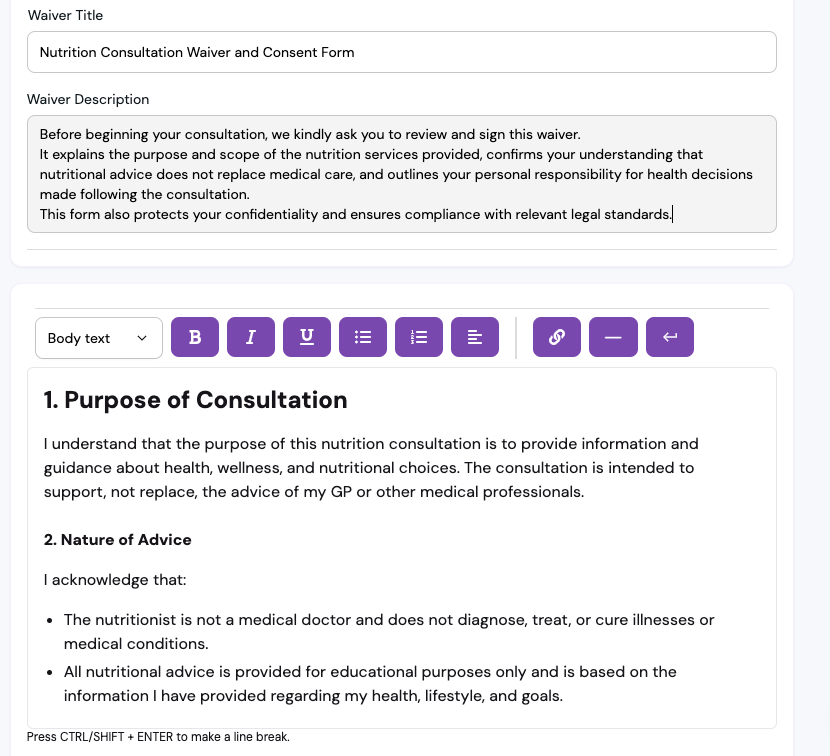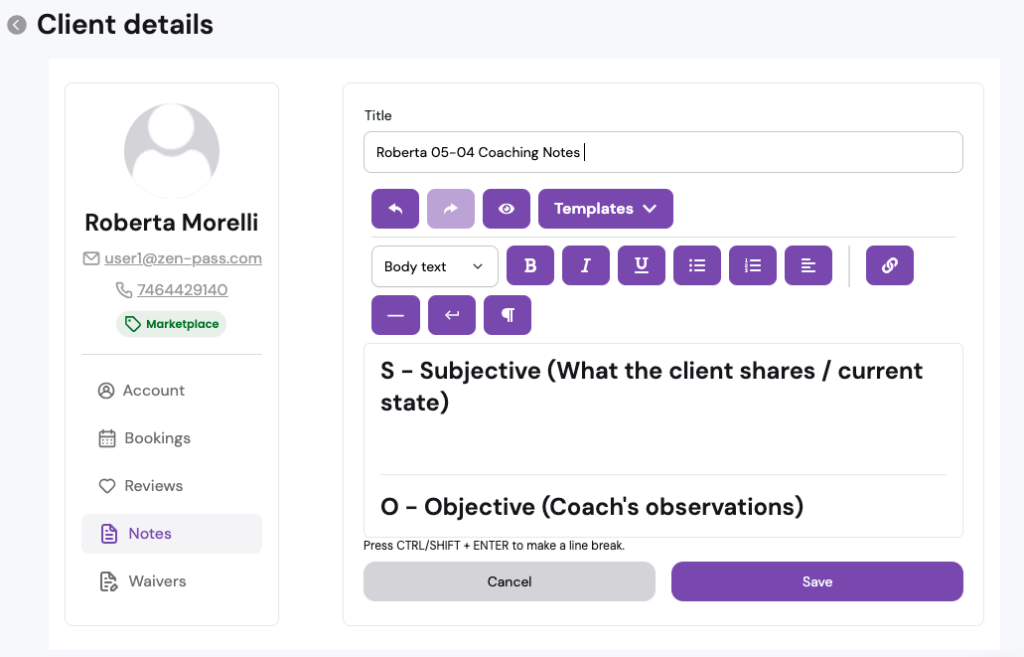As a coach, healer, or therapist, maintaining the confidentiality and safety of client sessions is essential.
Whether you are delivering services online or in person, implementing strong data protection practices is now a fundamental part of professional care.
This guide provides practical, actionable steps to help you deliver secure online sessions and confidential in-person sessions, whilst protecting your business and complying with GDPR requirements.
To see how ZenPass supports this level of professionalism across all practitioner types, take a closer look at our platform built for wellness experts.
Why Security Matters for Coaches, Healers, and Therapists
Each session involves sharing personal, sensitive information. Without robust security:
- Client trust can be lost.
- You could face legal penalties under GDPR.
- Your professional reputation may suffer lasting damage.
Wellness practitioners have a responsibility to create safe, confidential spaces both online and offline. Security is no longer an optional extra. It is an essential foundation for building client relationships and growing your practice.
Best Practices for Secure Online Sessions
Providing coaching, therapy, or healing services remotely can expose you to digital risks. Here is how to deliver secure online sessions and protect your clients:
1. Choose a Secure Video Platform
Use video conferencing platforms that prioritise security features such as:
- End-to-end encryption of video calls.
- Password-protected sessions.
- Waiting room functions to control who joins the meeting.
- No automatic recording without consent.
Recommended platforms include:
- Zoom: A popular choice among coaches and therapists. Use settings like Waiting Room, Meeting Passwords, and Enable Encryption.
- Google Meet: Offers secure video conferencing, encrypted data, and optional two-step verification.
Tip: Always generate a new meeting link for each session. Avoid reusing links across clients.
If you’re just getting started with your practice, this guide for new practitioners can help you establish secure systems from day one.
2. Obtain Explicit Consent Before Sessions

Before starting any online session:
- Send clients a GDPR-compliant consent form via ZenPass.
- Inform them if you plan to record a session and why.
- Provide information about how their data will be stored and protected.
Using secure consent forms strengthens client trust and supports your legal compliance obligations.
3. Secure Your Digital Environment
Protect your own workspace before connecting with clients:
- Connect only through secure, private Wi-Fi. Public hotspots are not safe for client sessions.
- Keep your software updated to close security gaps.
- Use trusted antivirus and firewall protections.
- Activate two-factor authentication on email and video platforms.
Tip: Set your video platform to automatically lock the meeting after the session starts to prevent uninvited access.
4. Protect Client Notes and Session Records

Sensitive session notes must be stored securely:
- Use encrypted cloud storage specifically designed for client data.
- Avoid saving client files directly on your desktop or downloads folder.
- Create strong, unique passwords for any file-sharing systems.
ZenPass Grow offers encrypted record management tailored for wellness practitioners to keep client data safe and compliant.
Learn more about the benefits of the Grow Plan and how it supports full-time practitioners with enhanced security tools.
5. Maintain Professional Boundaries Online
Project professionalism during online sessions:
- Choose a neutral, tidy background for video calls.
- Dress appropriately, as you would for in-person sessions.
- Start and end sessions punctually.
- Turn off mobile notifications and other distractions.
Platforms like Zoom and Google Meet also allow you to use virtual backgrounds to enhance professionalism if needed.
Best Practices for Secure In-Person Sessions
Delivering face-to-face coaching, therapy, or healing sessions requires attention to physical and procedural security as well.
1. Choose a Safe and Private Environment
The space where you meet clients should:
- Offer complete auditory and visual privacy.
- Restrict access to authorised individuals only.
- Include secure storage for any written records or documents.
Tip: If renting space within a shared venue, ensure your rental agreement addresses client confidentiality responsibilities.
2. Manage Paper Records Carefully
When using handwritten notes or physical client files:
- Store all documents in locked cabinets.
- Transport files securely, never leaving them unattended.
- Shred expired or outdated documents using a cross-cut shredder.
Paper security is as important as digital protection under GDPR regulations.
3. Obtain Clear Client Consent
In-person consent is just as vital as online consent:
- Have clients complete intake forms confirming understanding of session processes.
- Include privacy and data storage explanations.
- Update consent forms regularly if services change.
ZenPass Grow provides easy-to-adapt templates for GDPR-compliant client documentation.
4. Be Aware of Physical Security
Situational awareness helps protect client confidentiality:
- Ensure no unauthorised persons are nearby during sessions.
- Keep laptops, phones, and documents hidden from view between appointments.
- Ensure conversations are never accidentally overheard in waiting areas or corridors.
Client confidentiality extends beyond your therapy room walls.
5. Respect Boundaries During Hands-On Work
For therapies involving touch, such as massage, acupuncture, or reiki:
- Obtain clear, informed consent before beginning.
- Explain the nature, purpose, and boundaries of physical contact.
- Respect any indication of discomfort immediately.
Consent is an ongoing process that requires sensitivity and attentiveness.
3 Common Mistakes Practitioners Should Avoid
- Using WhatsApp or Facebook Messenger for client communication
These platforms are not secure enough for confidential therapeutic conversations. Use dedicated, encrypted tools designed for wellness practitioners.
- Saving session notes in personal email accounts
Email inboxes are vulnerable to hacking. Sensitive data must be stored in encrypted environments to stay GDPR-compliant.
- Recording Zoom sessions without client permission
Recording without prior consent breaches data protection laws and undermines client trust. Always gain informed, written consent first.
How ZenPass Grow Strengthens Your Security
ZenPass Grow supports wellness practitioners by providing:
- Encrypted client communication and secure document sharing.
- GDPR-compliant consent forms for all types of sessions.
- Cloud-based storage that protects sensitive notes and treatment plans.
- Priority security upgrades to defend against new cyber threats.
- Exclusive cyber insurance discounts for added peace of mind.
ZenPass Grow makes session security simple, effortless, and fully aligned with professional standards.
Conclusion: Protecting Your Clients Protects Your Practice
Delivering secure sessions is a non-negotiable part of modern wellness work.
By following these best practices, you show clients that you respect their privacy, honour their trust, and operate at the highest professional level.
Ready to offer secure sessions your clients can trust completely? Subscribe to ZenPass Grow today and future-proof your practice online and in person.
Your clients deserve safe spaces. ZenPass helps you create them.
Your wellness work deserves smooth support. Find clear, concise help on everything ZenPass: from first login to expert tips.
Get help now and keep your flow going.
Leave a Reply